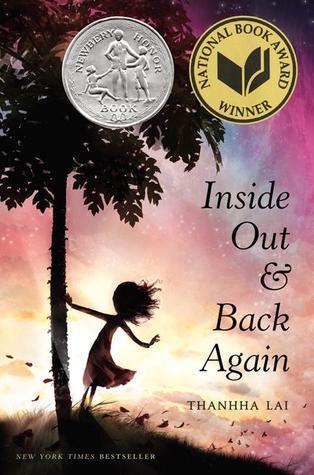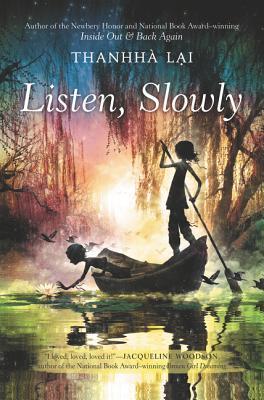I’m excited to share today’s spotlights with you, and return to Thanhha Lai‘s books! When I settled in to write about Listen, Slowly I went searching for my spotlight on Inside Out and Back Again and…couldn’t find it. I was sure I was just missing it, so searched again, and again, and still came up empty. Could it be I never wrote a post on that beautiful book? It appears so, which means I’m giving you a double-feature today because I simply can’t face spotlighting Listen, Slowly without also discussing Thanhha’s beautiful novel in verse, Inside Out and Back Again.
I don’t know if Thanhha intended it this way, but the two stories feel almost generational in that Inside Out and Back Again could be the story of Mai’s mother and grandmother, and their escape from war-torn Vietnam–with Mai being the main character of Listen, Slowly, who in that book is asked to go back to Vietnam with her grandmother in an attempt to find answers regarding her missing-in-action grandfather.
Of course, in the actual books, Mai travels back to Vietnam with her paternal grandmother, where as the way the events transpire in Inside Out and Back Again would better match the lives of her mother and maternal grandmother…but that isn’t really the point. Taken together, the two novels provide not only a powerful chance to understand the Vietnam of the past and present, but they also give the reader interesting glimpses into the way refugee families can grow and change over time, as American-born children quickly assimilate and run the risk of disconnecting from their past. Or, as Mai puts it when her parents encourage her to travel with her grandmother to Vietnam and connect with her roots–it’s not her roots, it’s theirs!
Similarly, I loved the way that Mai learns perspective on her own somewhat superficial challenges through the opportunity to connect on a deeper level with the sacrifices made by her grandparents, but also through seeing that while culture and customs and access to technology may vary widely, some things are always the same–like the ubiquity of teenage love triangles. Also teenage rebellion, friendship, and yearning for dreams. In both books, the girls enjoy unexpected friendships and meet people who defy their preconceived notions and show them that often people’s motives are more relatable than they might at first appear.
Kim, who is the main character of Inside Out and Back Again, is very different form Mai. Kim is a sometimes unwelcome refugee who has been permanently transplanted to a new land, while Mai is the privileged daughter of a doctor visiting friendly–if mostly unknown–relatives for a couple months. But both of them face a language barrier, homesickness, and adjusting to different cultures with their own set of expectations and taboos. I found it to be really interesting to read the first book and then the second and then draw parallels, deepening my appreciation for both.
Finally, I have to mention how much I loved the way the language changed when Mai’s grandmother was speaking and telling her story! The teenage slang and attitude disappeared and a flowing poetry of words poured onto the page. It was really lovely–like a peaceful sigh at sunset. This language beautifully mirrored the free verse writing of Inside Out and Back Again, reflecting the way the Vietnamese language impacts the speaker and listener.
Now, let’s hear what Apricot-kitty has to share:

I enjoyed the books–especially the second. I think you should read that one aloud over and over until these young cats understand the way their elders should be treated!
OMG, she’s so right about that! In Listen, Slowly Mai often thinks ‘Oh, to be old in this country!’ when observing how her grandmother is treated, and I have to echo that. Even here in the US older people were (I believe) treated with respect as a general rule until relatively recently and the Vietnamese perspective on age and the wisdom which usually comes with it puts us to shame and really highlights what we’ve lost. Assuming it was ever here…my family experiences as a child were unusual so I’m perhaps not the best resource on that. I also realize that social progress is sometimes inhibited by the firmly held beliefs of the older generation…but that’s often true of younger people, too, so I’m still going on record to say I LOVED this example of how to treat tiny white-haired grandmothers!
Tell me what you’re reading in the comments, and how your summer is going! Also, don’t forget to visit Greg’s blog, then hop around to check out all the other Marvelous Middle Grade Monday reviews, spotlights, giveaways and interviews!



Greg Pattridge
Suzanne
Sue Heavenrich
Suzanne
Patricia Tilton
Suzanne
Natalie Aguirre
Suzanne
Rosi Hollinbeck
Suzanne
Christi M.
Suzanne
Stephanie@Fairday's Blog
Suzanne